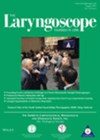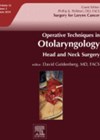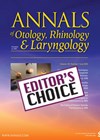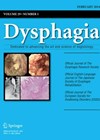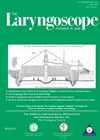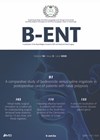
Journal Reviews
How rare is vocal fold paralysis after spinal and epidural anaesthesia – should we be more concerned?
The authors present an unusual case of right vocal fold paralysis. Their patient was a 38-year-old woman who experienced new onset dysphonia following neuraxial anaesthesia (NA) for a caesarean section. Flexible nasendoscopy showed a right VFP with fixation in the...
Transoral laser microsurgery (TLM)
This review article describes the surgical technique of transoral laser microsurgery (TLM) for the piecemeal removal of tumours of the upper aerodigestive tract using carbon dioxide laser. This technique gained acceptance after Wolfgang Steiner published his paper on the treatment...
Poking the bear: learning to drain quinsy on a mannequin head
Simulation in medicine has gained significant traction in both undergraduate and postgraduate training over the last couple of decades or so – the benefits to all involved are clear. The airline industry models for human factors and crew resource management...
Reducing pulse rate in videofluoroscopy: less is not best!
Recently, there has been increasing discussion in clinical meetings about the use of ionising radiation in swallowing assessments and the associated cancer risks. This is therefore a timely publication to inform discussions around whether reducing pulse rate from 30 pulses...
How are swallowing and voice affected following anterior cervical discectomy and fusion (ACDF)?
Anterior cervical discectomy and fusion (ACDF) requires an anterior transcervical approach (ACA) to allow decompression of the cervical spine and nerve roots. This approach is also occasionally used for corpectomy and osteophyte removal. Key neurovascular structures related to swallowing and...
How common is oropharyngeal dysphagia amongst the adult population?
It is well known that oropharyngeal dysphagia (OD) is a symptom arising from many different aetiologies or disease conditions and that it is a significant morbidity affecting people’s quality of life. Establishing the prevalence of OD is complicated by the...
What is the relationship between swallowing difficulties and underlying mental health issues?
People living with dysphagia often experience mental health difficulties. This study aimed to identify whether pre-existing anxiety and depression impacted patient scores on a patient-reported swallowing outcome measure, the Eating Assessment Tool (EAT-10) where a score of ≥3 is indicative...
THRIVE: redefining airway management in endoscopic oesophageal surgery
Transnasal humidified rapid insufflation ventilatory exchange (THRIVE) is no longer just a tool to help anaesthetists secure a difficult airway. Thanks to the work of authors like Yang and colleagues, it is being revolutionised to provide apnoeic oxygenation during endoscopic...
COVID-19 and dysphagia in critically ill patients: a reflection of some findings
Dysphagia was a common occurrence in patients admitted to intensive care units (ITU) during the pandemic. This paper explores data from 26 ITUs over 12 months during 2020-2021. Findings from 235 patients admitted with Delta and subsequent Covid variants who...
Diurnal and monthly variations in secondary post-tonsillectomy haemorrhage rates
Several studies have looked into variable haemorrhagic rates with different methods of surgery and clinical backgrounds. Few have looked into non-clinical factors such as environment and diurnal influence on occurrence of post-tonsillectomy bleeding. This extensive study comprises 5357 tonsillectomy patients...
Can prediction models help identify dysphagia in ventilated patients?
Dysphagia commonly affects patients in intensive care units (ICU), particularly those on mechanical ventilation, and is associated with high risk of mortality. This systematic review and meta-analysis aimed to identify predictors for dysphagia in ventilated ICU patients by summarising existing...
Lymph node metastases in papillary thyroid cancer
This retrospective Korean cohort study looked at the risk factors associated with bilateral lateral lymph node metastases in patients with unilateral papillary thyroid cancer. There were 11 patients who met the inclusion criteria across an 11-year period from 2009 to...

